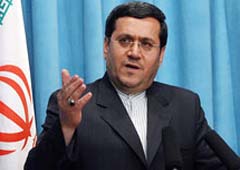Iranian foreign ministry spokesman Monday lambasted the recent move by European and British lawmakers to remove the anti-Iran terrorist group, the Mojahedin-e Khalq Organization (MKO), from the US black list. 
"Utilizing the MKO, which is a used card, would be useless for the westerners," Hassan Qashqavi told reporters in a weekly press conference here in Tehran on Monday.
Asked to comment on the recent request by some European and British Lawmakers from US President Barack Obama to strike the name of the MKO off the US terror list, Qashqavi strongly criticized EU ignorance and compromise with terrorists and extremists, MKO in particular.
"Any compromise with terrorists, including the MKO, would produce negative outcomes for all those who support these terrorists," Qashqavi noted.
After removing an anti-Iranian terror group from their blacklist, more than 100 members of the European Parliament have tried to persuade the US president to lift an American ban on the Mojahedin Khalq Organization.
Meantime, More than 180 members of the British Parliament issued a letter to President Obama, urging him to change the terrorist status of the MKO.
The anti-Iran terror group, blacklisted as a terrorist organization by many international entities and countries, was put on the US terror list in 1997 by the then President, Bill Clinton.
The MKO, whose main stronghold is in Iraq, is blacklisted by much of the international community, including the United States.
Before an overture by the EU, the MKO was on the European Union’s list of terrorist organizations subject to an EU-wide assets freeze. Yet, the MKO puppet leader, Maryam Rajavi, who has residency in France, regularly visited Brussels and despite the ban enjoyed full freedom in Europe.
The MKO is behind a slew of assassinations and bombings inside Iran, a number of EU parliamentarians said in a recent letter in which they slammed a British court decision to remove the MKO from the British terror list. The EU officials also added that the group has no public support within Iran because of their role in helping Saddam Hussein in the Iraqi imposed war on Iran (1980-1988).
Many of the MKO members abandoned the terrorist organization while most of those still remaining in the camp are said to be willing to quit but are under pressure and torture not to do so.
A May 2005 Human Rights Watch report accused the MKO of running prison camps in Iraq and committing human rights violations.
According to the Human Rights Watch report, the outlawed group puts defectors under torture and jail terms.
The group, founded in the 1960s, blended elements of Islamism and Stalinism and participated in the overthrow of the US-backed Shah of Iran in 1979. Ahead of the revolution, the MKO conducted attacks and assassinations against both Iranian and Western targets.
Leaders of the group have been fighting to shed its terrorist tag after a series of bloody anti-Western attacks in the 1970s, and nearly 30 years of violent struggle against the Islamic Republic of Iran.
In recent months, high-ranking MKO members have been lobbying governments around the world in the hope of acknowledgement as a legitimate opposition group.
The group started assassination of the citizens and officials after the revolution in a bid to take control of the newly established Islamic Republic. It killed several of Iran’s new leaders in the early years after the revolution, including the then President, Mohammad Ali Rajayee, Prime Minister, Mohammad Javad Bahonar and the Judiciary Chief, Mohammad Hossein Beheshti who were killed in bomb attacks by MKO members in 1981.
The group fled to Iraq in 1986, where it was protected by Saddam Hussein and where it helped the Iraqi dictator suppress Shiite and Kurd uprisings in the country.
The terrorist group joined Saddam’s army during the Iraqi imposed war on Iran (1980-1988) and helped Saddam and killed thousands of Iranian civilians and soldiers during the US-backed Iraqi imposed war on Iran.
Since the 2003 US invasion of Iraq, the group, which now adheres to a pro-free-market philosophy, has been strongly backed by neo-conservatives in the United States, who also argue for the MKO to be taken off the US terror list.
The MKO has been in Iraq’s Diyala province since the 1980s. The Iraqi government and parliament has announced that it would not tolerate the group anymore and is seeking to expel the group from the country in the near future.

